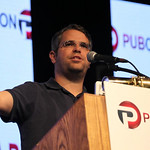 Matt Cutts, the head of Google’s webspam team, keynoted the 2nd day of PubCon in Las Vegas, and spoke on a wide range of topics. According to a report by Jennifer Slegg for SearchEngineWatch, Cutts discussed things that include Hummingbird, Panda, Penguin, Authorship and the future of Google Search.
Matt Cutts, the head of Google’s webspam team, keynoted the 2nd day of PubCon in Las Vegas, and spoke on a wide range of topics. According to a report by Jennifer Slegg for SearchEngineWatch, Cutts discussed things that include Hummingbird, Panda, Penguin, Authorship and the future of Google Search.
Softening Panda
In his speech, Cutts said Google is considering softening Panda, the change to Google’s search results ranking algorithm that has clearly affected a lot of sites since its launch in February 2011. For those whose sites are among those caught in Panda’s grey area, there’s a chance they could rank again if they are actually quality sites.
Cutts also said most blog posts that give tips on how to rank with Hummingbird are simply irrelevant. After all, Hummingbird doesn’t really have that much of an impact on SEO, as it is a core quality change more than anything else according to Cutts.
More Penguin changes
As for its Penguin algorithm, Cutts said we should expect more Penguin changes in the future, especially after black hatters belittled Penguin 2.0. In other words, we better buckle up for a more intense spam strategy from Google in the future. At Google’s crosshairs are very spammy keywords like “payday loans” and “car insurance”, and Cutts said they are targetting them for better results. Also being targeted: spam networks, against which Google is continuing to take action.
Combating negative SEO
Negative SEO was also brought up during PubCon, with Cutts saying it is often self-inflicted and not really that common. He also reiterated that Google has put up a disavow tool for this, so that if a website owner discovers he or she is being torpedoed with thousands of paid links, he or she ought to use Google Webmaster Tools and get rid of those links.
Focus on Authorship
Cutts talked at length about Authorship, saying it is one area that Google wants to improve. Authorship is actually part of its spam strategy, and Google intends to tighten it to fight spam, boost authority and increase the presence of better quality authors. This, according to Cutts, is the direction Google wants to follow, as authorship has already become very important for search results and visibility.
I’m sure that over time, Cutts will be announcing more Penguin changes–among other things–in future PubCons and other conventions. But for this year’s PubCon, Cutts has made it clear enough to site owners interested in providing good quality experiences for their users that they should not take shortcuts and get some voodoo SEO provider to get them to page 1. With all the changes Google is implementing, they either won’t work or won’t work for long, not to mention just too risky to try.
Click here to read the full article.
